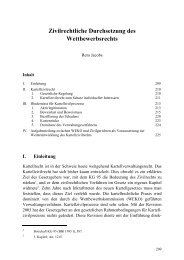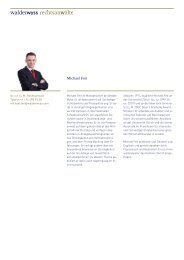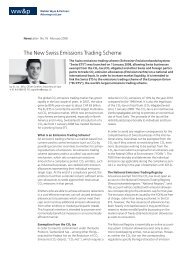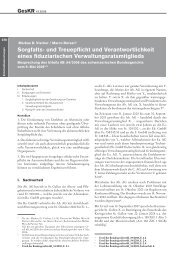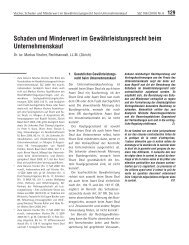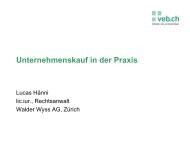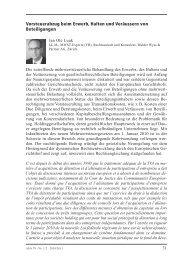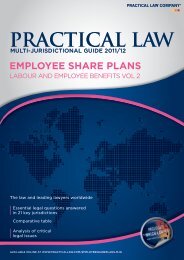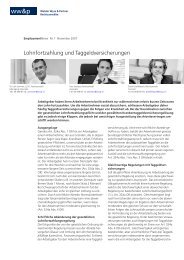Judgment of 7 March 2012 - Walder Wyss Ltd.
Judgment of 7 March 2012 - Walder Wyss Ltd.
Judgment of 7 March 2012 - Walder Wyss Ltd.
Create successful ePaper yourself
Turn your PDF publications into a flip-book with our unique Google optimized e-Paper software.
A-6537/2010<br />
T.<br />
On 21 July 2011 the complainant submitted a supplement to its submission dated 11 July 2011,<br />
arguing in particular that designating the counterparty to the swaps as the beneficial owner<br />
would create the very legal situation against which a number <strong>of</strong> different industry associations<br />
had warned in their statement <strong>of</strong> position on the OECD ‘Discussion Draft’.<br />
Where relevant to the tribunal’s decision, all due account is taken <strong>of</strong> the submissions <strong>of</strong> the<br />
parties in the following considerations.<br />
The Federal Administrative Tribunal takes into consideration:<br />
1.<br />
1.1. The Federal Administrative Tribunal adjudicates complaints against administrative<br />
decisions pursuant to art 5 <strong>of</strong> the Federal Act <strong>of</strong> 20 December 1968 on Administrative<br />
Proceedings (APA, Verwaltungsverfahrensgesetz, VwVG, SR 172.021; cf art 31 <strong>of</strong> the Federal<br />
Administrative Tribunal Act <strong>of</strong> 17 June 2005 [ATA, Verwaltungsgerichtsgesetz, VGG, SR<br />
173.32]). SFTA decisions within the meaning <strong>of</strong> art 3 O-DTC-DK are subject to complaint to the<br />
Federal Administrative Tribunal (art 3(4) O-DTC-DK in conjunction with art 44 APA, art 31 ATA,<br />
art 32(2)(a) ATA e contrario, art 33(d) ATA). The Federal Administrative Tribunal is thus<br />
competent to hear the complaint lodged by the complainant on 13 September 2010 (as already<br />
decided with final legal effect by interim decision <strong>of</strong> the Federal Administrative Tribunal A-<br />
6537/2010 <strong>of</strong> 11 January 2011). The complaint, lodged in good time and in the correct formal<br />
manner, is to be entered into.<br />
1.2. The Federal Administrative Tribunal can in principle review the impugned decision in its<br />
entirety. In addition to citing the infringement <strong>of</strong> Federal law (art 49(a) APA) and incorrect or<br />
incomplete ascertainment <strong>of</strong> the legally pertinent facts (art 49(b) APA), a complainant may also<br />
object to the decision as being unreasonable (art 49(c) APA; cf André Moser/Michael<br />
Beusch/Lorenz Kneubühler, Prozessieren vor dem Bundesverwaltungsgericht, Basel 2008,<br />
s 2.149). As a matter <strong>of</strong> principle in complaint proceedings the tribunal applies the law ex <strong>of</strong>ficio.<br />
With the co-operation <strong>of</strong> the parties the Federal Administrative Tribunal therefore has a duty to<br />
apply the correct legal provisions to the facts as established, ie to apply what it regards as the<br />
appropriate legal rule, and to give it the interpretation <strong>of</strong> which the tribunal is convinced. The<br />
duty to apply the law ex <strong>of</strong>ficio means that, as complaint instance, the Federal Administrative<br />
Tribunal is not bound by the arguments advanced by the parties in support <strong>of</strong> their motions<br />
(art 62(4) APA) and may (partially) uphold an complaint for reasons other than those asserted<br />
or may uphold the impugned decision for reasons other than those put forward by the lower<br />
instance (cf decision <strong>of</strong> the Federal Administrative Tribunal BVGE 2009/61 cons. 6.1 with<br />
reference to decision <strong>of</strong> the Federal Administrative Tribunal BVGE 2007/41 cons. 2 with further<br />
refs.).<br />
1.3. Article 29(1) Federal Constitution (Bundesverfassung, BV) states that one <strong>of</strong> the minimum<br />
requirements <strong>of</strong> constitutional due process is that decisions should be handed down within an<br />
appropriate time period. Any assessment <strong>of</strong> whether the duration <strong>of</strong> a proceeding is in line with<br />
the requirements <strong>of</strong> due process should be based by analogy on the criteria developed to<br />
adjudicate complaints on the grounds <strong>of</strong> delay <strong>of</strong> due process (cf judgment <strong>of</strong> the Federal<br />
Supreme Court 12T_1/2007 <strong>of</strong> 29 May 2007 cons. 3). The appropriateness or otherwise <strong>of</strong> the<br />
duration <strong>of</strong> a proceeding is not determined in absolute terms but with due regard to the general<br />
circumstances <strong>of</strong> each individual case (roughly, the nature, scope and complexity <strong>of</strong> the matter,<br />
Translation © <strong>Walder</strong> <strong>Wyss</strong> <strong>Ltd</strong>. 8 / 23



